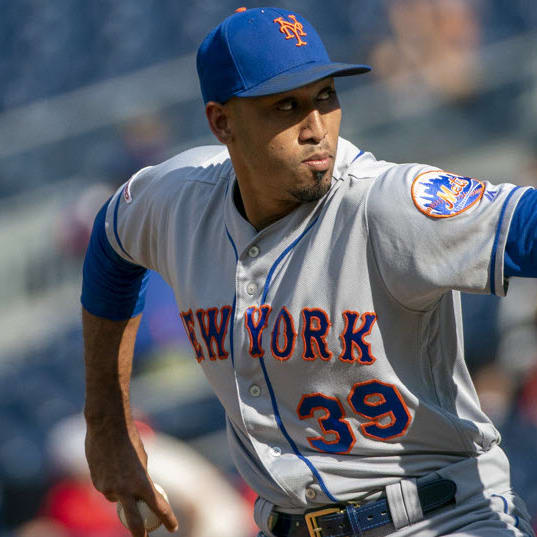This article is part of our Pitching 3D series.
Good pitching is good pitching, but the impact of a hurler's stats on his owner's bottom line can be highly dependent on the style of fantasy game in question. The biggest discrepancy comes from season-long leagues versus DFS, the latter of which emphasizes a pitcher's per-start value while the former rewards long-term success. And though a pitcher's daily opponents tend to take much of the focus in DFS, his ability to generate stats on a game-to-game basis is highly dependent on his overall efficiency of pitch counts.
Pitchers who trend toward longer outings are worth substantially more in DFS, because the game rewards counting stats. Fantasy points for innings, strikeouts and wins, with longer outings rewarding guaranteed points in the first two categories and a higher probability of securing the points for a win, can make a substantial dent on a team's bottom line on some sites. A season-long team might not be pleased when their starter goes out there for an extra frame and gets scored upon, but the DFS gamer knows that the run is erased by the inning pitched and that any strikeouts just add to the point total.
This is why some pitchers are more appealing for season-long leagues than for DFS, and vice versa. If the pitcher struggles with pitch counts and is typically bounced before completing the sixth inning, then a low ERA or WHIP can be easily overshadowed by another pitcher with a longer leash. However, those in season-long leagues will look more
Good pitching is good pitching, but the impact of a hurler's stats on his owner's bottom line can be highly dependent on the style of fantasy game in question. The biggest discrepancy comes from season-long leagues versus DFS, the latter of which emphasizes a pitcher's per-start value while the former rewards long-term success. And though a pitcher's daily opponents tend to take much of the focus in DFS, his ability to generate stats on a game-to-game basis is highly dependent on his overall efficiency of pitch counts.
Pitchers who trend toward longer outings are worth substantially more in DFS, because the game rewards counting stats. Fantasy points for innings, strikeouts and wins, with longer outings rewarding guaranteed points in the first two categories and a higher probability of securing the points for a win, can make a substantial dent on a team's bottom line on some sites. A season-long team might not be pleased when their starter goes out there for an extra frame and gets scored upon, but the DFS gamer knows that the run is erased by the inning pitched and that any strikeouts just add to the point total.
This is why some pitchers are more appealing for season-long leagues than for DFS, and vice versa. If the pitcher struggles with pitch counts and is typically bounced before completing the sixth inning, then a low ERA or WHIP can be easily overshadowed by another pitcher with a longer leash. However, those in season-long leagues will look more strongly at ratios that will hold up over a per-inning basis. Obviously, pitchers who present skills at both ends of the spectrum offer the best of both worlds, but these tend to be the top-rated pitchers in any fantasy game and are impact arms in all formats. The intrigue lies with those pitchers on the extremes who might be more suited to one game over another.
For example, when we look at the list of pitchers with the most starts of at least 7.0 innings this season, the players at the top are generally the best pitchers in the game. In fact, Clayton Kershaw is still tied (with Chris Sale) for the most starts of 7.0 or more innings this season (14 times in 16 starts), despite the fact that he has missed the last month of the season. There is also an interesting tipping point once we get beyond 10 such starts, as the list of pitchers with 10 is quite distinguished - Madison Bumgarner, Jake Arrieta, Stephen Strasburg and Jon Lester - but the next step down is a longer list of less-impressive arms. However, there are a few names near the top that might be surprising.
High-Volume
Pitchers who consistently pitch deep into games have even more value in DFS than in seasonal leagues. There are three pitchers who have gone 7.0 innings deep in 13 of their turns, and while each of these players is a well-known fantasy commodity, some might not have the luster of the Sales and Bumgarners of the world. Max Scherzer is exactly as advertised, but the other two pitchers with 13 long starts are Corey Kluber and Johnny Cueto, a pair of players who are sometimes overlooked for various reasons.
In the case of Kluber, it's his penchant for blow-up starts, but he carries immense value in DFS thanks to his tendency to go deep into games and stockpile the counting stats. DFS also rewards high-end scores more than it punishes lower ones, and Kluber offers the possibility for a formidable spike in points on any given day; he has scored more than 35 points on DraftKings four different times this season. Cueto is even more hidden in the reeds, as he tends to get pushed below the other top-end pitchers on the expected value scale, but his tendency to go deep into games while keeping runs off the scoreboard result in a very high floor for DFS and a surprisingly-high ceiling - Cueto also has four games of at least 35 fantasy points on DraftKings.
There are only two pitchers who have 12 seven-inning starts, neither of whom is ever mentioned in the same breath as the other pitchers that have detailed so far. Justin Verlander is a workhorse who has enjoyed a bit of a renaissance this season, so perhaps his inclusion isn't particularly surprising, but it vaults his DFS value nonetheless. Keep this in mind when considering adding Verlander to the lineup. The upside isn't quite as high - he has cleared 35 points (DK) just once this season - but the floor is substantial. The final pitcher with a dozen 7.0-inning starts is much more surprising: Tanner Roark. Roark's peripherals are uninspiring, to say the least, with a modest 7.4 K/9 and a walk rate of 2.7 BB/9 that's near league average. Once again, his value has been more about floor than ceiling, as he has not cleared 35 fantasy points in a game this season and has beaten 30 points just once. However, he profiles well as an SP2 in a two-pitcher DFS league.
There is also intrigue in the list of pitchers who have gone seven frames deep 11 times, though the group is much more eclectic than those under the microscope so far. First off is David Price, whose pedigree will lead to a high price but whose season-long struggles have kept him hurting many fantasy rosters. The upside is still immense, and Price has a tendency to stay in the game even when runners are crossing the plate, and his ability to spike a big K count or last into the late innings should not be discounted at the DFS table. Aaron Sanchez came into the season with a very short track record and plenty of skepticism regarding his effectiveness, but he has been the best pitcher on the Toronto staff, hands down. He might only have a few starts remaining as the Jays consider moving Sanchez to the bullpen in order to limit his innings, but they have shown no such worry on a start-by-start basis, making him an undervalued asset in DFS. Finally, there's Julio Teheran, whose safety in this breakout season has not been missed by the masses.
Low Volume
Ok, so those are some top-end options that might be overlooked, but what if we flip the script? This might have a greater influence on decision making, as there are plenty of players who seem to have a high DFS salary based on their roto ratios - ERA, WHIP and K rate - but whose lack of pitch-count efficiency and/or proclivity for short outings severely dents their value.
Jake Odorizzi tops the list. He has the highest rate of pitches-per-plate-appearance in baseball this season (among qualified starters) with 4.33 P/PA. The Rays have not been shy about his total pitch counts - Odorizzi has crossed the 110-pitch barrier four times - but he has failed to finish the sixth inning a whopping 12 times in 21 starts this year due to the high pitch counts. Odorizzi has maintained a respectable WHIP through his career (1.23) and his peripherals are superior to the Tanner Roarks of the world, but Odorizzi's frequency of early showers is too high to trust in DFS.
Kenta Maeda is another short-outing pitcher, but his issues have more to do with overall pitch counts than pitches per batter. The Dodgers have kept him under 100 pitches in all but five of his 20 starts, capping him at 107 throws, and he's thrown 92 or fewer pitches in four of his last six starts. Perhaps the usage is tied to Maeda's transition from Japan, which typically involves one fewer day of rest between starts, but the fact remains that the limited pitch counts negatively impact his DFS value, and he has failed to finish the sixth inning in nine of his turns this season.
Michael Pineda is the king of going exactly 6.0 innings in a start, something that he has accomplished nine times this season, but he has gone beyond 6.0 frames just twice in his 20 games started (he has also gone less than 6.0 innings nine times). In the two games where Pineda went beyond the threshold for a baseline quality start, he only managed 7.0 innings in each, and the result has been a pitcher who has cleared 30 points on DK just once this season despite his astounding 135 strikeouts in 113.1 innings (AL-leading 10.7 K/9).
Danny Salazar has been one of the best pitchers in the American League, but his value is very different when talking about seasonal leagues versus DFS. Among qualified pitchers, his 4.11 pitches-per-plate-appearance represents the seventh-highest total in baseball, and it has led to his falling short of 6.0 innings in nine of his 19 starts this year. He still has upside, with the capacity to crack 30 points on DraftKings - he's done so five different times this season - thanks to the Indians giving him a generous pitch count on a per-game basis, but Salazar sometimes gets in his own way in posting a short outing.
Scott Kazmir has had a rough season, no doubt, but his strikeout rate of 9.6 K/9 continues to encourage some owners who are waiting for him to have a big game. The problem is that the Dodgers might never let that happen. Kazmir has been held at or under 100 pitches in 15 of his 20 starts this season, including his last 11 turns. He has only gone over 6.0 innings three times this season, but he's fallen short of the 6.0-inning mark in 11 of his starts, as any positive impact that he has in the ratio categories is marginalized by the tepid usage patterns. Kazmir exemplifies the underside of the DFS-seasonal discrepancy well, as his work has value in season-long leagues but his lack of per-game efficiency is a killer to his DFS value.









